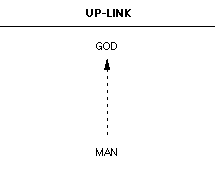
26 February 1970
updated annually through
10 March 1990
Prayer is defined as "an attempt to communicate with God." Therefore, what we know about other forms of communication may help to clarify our understanding of prayer.
First: any form of communication requires both a transmitter and a receiver. In other words, transmission without reception is not communication.

Prayer is normally considered to be communication from man to God. We transmit and God receives--but this kind of one-way communication has some inherent problems:

One-way communication from God to man is called inspiration or revelation or "the word of God." God transmits and man receives. The Bible is full of examples:
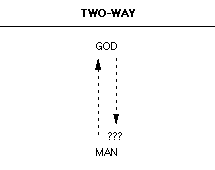
Any two-way communication requires four basic elements--two transmitters and two receivers--arranged as a pair of communication links.
We transmit and God receives; and God transmits, but we don't listen very well. That's the problem.
However...
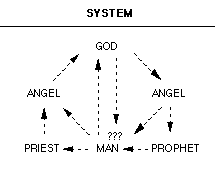
When men want to communicate with God but don't know how, they may go to those who can (or say they can). They may communicate with God through His angels, but they usually go to other human beings.
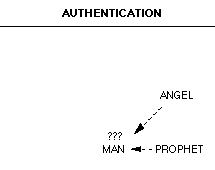
Angel means "messenger" and prophet means "spokesman" but neither of these terms necessarily refers to an angel or prophet of God. A fallen angel or a false prophet can claim to speak for God when it is not so, and this world is full of writings that claim to be the will or the way of God.
Therefore, the critical questions are always the same: "Whose messenger is this? Whose spokesman? Where did this idea come from? Who speaks for God and who does not?"
A radio receiver usually has a dial, or some kind of indicator, to show where it is tuned and which way is up (and down) the electromagnetic spectrum. Here is an analogy ...
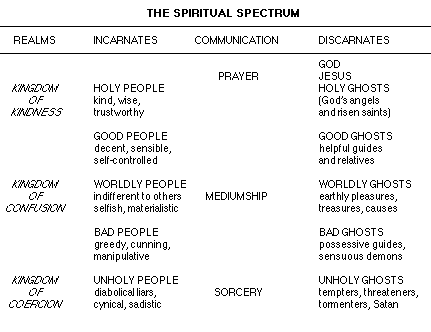
Note that the key to this spectrum is attitude toward others. Higher beings are more loving; lower beings are less loving. God is the Author of love and truth. Jesus loves all; Satan loves none. All other entities vary by degree. That is the fundamental difference, whether the entities involved are incarnate (in a physical body) or discarnate (not in a physical body).
The internal frequency of a radio receiver determines which transmitters it will pick up, and the directional antenna of a television set further aligns its reception to a particular station. The analogy is suitable--the difference between prayer, mediumship and sorcery is in the tuning of the receiver.
To receive messages from God, tune yourself up toward the top of this spectrum. Moment by moment, whether your real purpose is to give or to get, to serve or be served, is the pivot-point on which your spiritual direction turns upward or down.
To decide which level of the spiritual spectrum a message is coming from, look for the fruit of the Holy Spirit (Galatians 5:22-23). Thus, by their fruit, we can know who speaks for God and who does not (Matthew 7:15-20).
Also note what happens when people die: holy people become holy ghosts; good people become good ghosts; etc.. This is automatic.
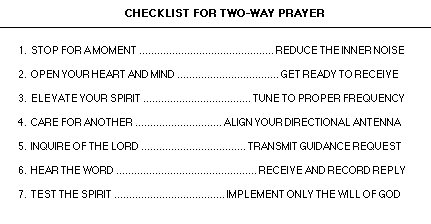
1. Stop for a moment: Set aside your problems. Let the tension go. For the moment, only dwell on calm and peaceful things. Don't worry about formalities. Don't try to concentrate. Just get quiet. Reduce the inner noise so you can hear.
2. Open your heart and mind: Let go of resentment. Confess your faults--and your fears. Get it off your chest so you can rise. Admit the fact that some of your ideas may be false. Dare to care. Dare to face the truth. Get ready to receive.
3. Elevate your spirit: Remember a specific example of something good or true or beautiful or holy, and see the hand of God at work in it. Continue to recall examples. Notice the upward flow of reverent joy within you--but don't get addicted to it. Just tune your spirit up toward the frequency of God's transmitter.
4. Care for another: Set aside your self-interest and focus good will on a specific person. Care for that person as God cares: without any other motivation, choose to desire for him or her the truest of blessings. This aligns your free will with the will of God--and thus automatically aligns your directional antenna.
5. Then pray: "Father, how can we help this person?" Don't assume that you know the answer. Do not invoke less-than-holy discarnates. Inquire of the Lord.
6. And then listen: Stop thinking for a moment and notice what pops into your mind. A light reverie is best; full trance is neither necessary nor desirable. If you receive no reply, just go about your business and try again later. A message may come in a variety of forms, but in any case:
7. Test the spirit: Look for the implied purpose of the message. Ask yourself "Where is this coming from? Where will it lead?" Use your experience with good folks and bad folks. Cross-check with the New Testament. Ask a trusted friend to help. Once you are satisfied that a message is coming from God, get off your duff and implement His guidance. Just don't forget to check in once in awhile to see if He has any more messages for you.
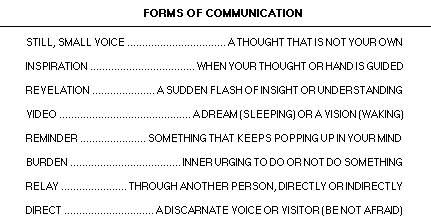
All of these can be forms of discarnate communication. The only real difference between them is technical, like the difference between telegraph, telephone, radio, television, etc. Therefore, it doesn't matter which form of communication is used.
CAVEATS
COMMUNICATION WITH DISCARNATES
Objections:
BY THEIR FRUITS YOU WILL KNOW THEM
Evaluate the source of any message just as though you heard it on the radio, saw it on television or read it in the newspaper: look for the implied purpose. Ask yourself "Where is this guy coming from? What does he want? What does he want me to do ... or be?" It really isn't difficult -- you should already know how to tell a good guy from a bad guy, and the same criteria apply whether the guy is incarnate or discarnate. Therefore, the same criteria also apply whether the message comes from an external source or out of your own subconscious mind:
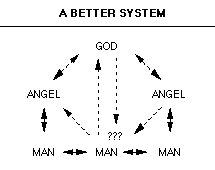
SMALL-GROUP TWO-WAY PRAYER
0. Agree. Identify in advance the person on whom you will all focus your caring, and the specific question you will raise on behalf of that person. Someone should write down the name and the question. It's OK to prepare a list of people to pray for, but take only a few at any one meeting, and pray for them one at a time.
1. Stop. Meet in a quiet place, invite the presence of the Lord, sing a hymn--and then be silent for a few minutes while each tries to reduce your inner noise.
2. Open. Continue in silence for another minute while each tries to open your heart and mind. Think about your preconceptions and personal preferences--and set them aside--but do not open to receive discarnate messages at this point.
3. Elevate. Here, you can help each other. Each may share one brief example of something good or true or beautiful or holy--but do not discuss these examples now. Quietly sing together one of the great hymns: get into it and let it get into you.
4. Care. Someone mention the name of the person, and all focus their caring on that person. If you don't know the person, focus caring on someone who does.
5. Pray. Someone read the question, and all ask the Lord that question inwardly.
6. Listen. Each must listen for the Lord's reply in your own way. One minute is enough. Note whatever you received--or the fact you did not receive anything.
7. Test. Each share--and all discuss--what was received. Take plenty of time. Test each message and decide, as a group, what level of the spiritual spectrum it came from. Implement those messages that all agree must have come from God.
NOTES
Each member of a two-way prayer group functions as both priest and prophet for the others, by raising their concerns to God and relaying His messages to them. If one is so troubled that he or she can't hear the Lord, the others can ask for and receive guidance on his or her behalf. This is a major benefit.
There is strength and safety in this approach, but there are certain requirements.
Anyone may be unable to receive at a given point in time, so all must be able to say "I didn't receive anything." Watch out for your own pride: don't make the ability to receive discarnate messages a test of faith or status, as some have done with the gift of tongues. The feeling that you should get something automatically turns your spiritual direction downward, toward lower levels of the spiritual spectrum.
In order to depend on each other to point out less-than-holy thoughts or messages, each must be able to say "That didn't sound like it came from God" and each must be willing to accept such statements--especially those who receive most often.
It is best to pray for someone in your family, a friend, or an acquaintance, because it's almost impossible to focus your caring on someone you really don't know.
Don't just pray for those who are desperately sick or in trouble, especially at first. Your concern for them may depress your spirit so far you can't hear the Lord.
Make sure the questions you raise are real questions, not answers in disguise or "proof-tests" in which you think you already know what God would say.
The basic question is "Father, how can we help this person?" In this question, we start with our faith in the good-will of God, and ask Him how to do His will, as His agents on earth. Much of our joy is in helping Him answer other people's prayers.
It is good to ask God for His view of any moral decision--but don't assume that His answer must be either "A" or "B". Let Him teach you what is right and wrong. As Jesus said "Seek first the Kingdom of God and His righteousness."
The fact that two or more people received the same message can help strengthen the confidence of the group, but it does not prove that the message came from God.
It has been said "Time belongs to man, but the timing belongs to God," so be open to the possibility that God might say, Please wait, Not now, Not yet, Later or No.
Don't be surprised if you receive a question, instead of an answer. The Lord often uses this method of teaching. Think about and discuss the question received.
And don't be surprised if you receive something like "Is that so very important?" We humans are notorious for worrying about things that really do not matter.
Small-group two-way prayer is a supplement, not a substitute, for private two-way prayer. Jesus said "Where two or three are gathered in my name, there I am in the midst of them" (Matthew 18:20), and he also said "When you pray, go into your private room, and close the door, and pray to your Father in secret" (Matthew 6:6).